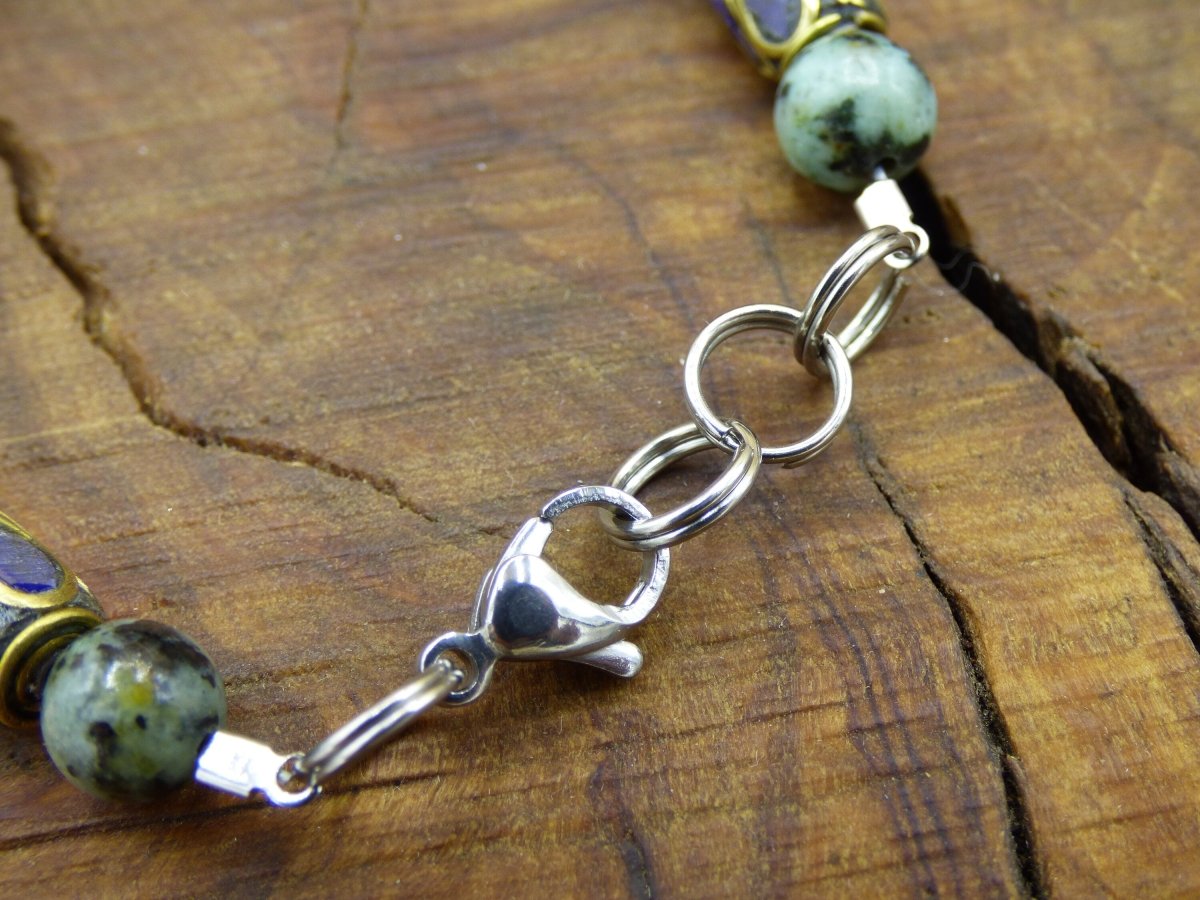



Gemstone Bracelet with African Turquoise & Peruvian Tibetan Ceramic Beads
~304 stainless steel
~High quality natural gemstones
~Handmade from Berlin
~Repair guarantee
~You will receive a bracelet as shown
Native Americans revere turquoise as a strong protective stone because, in their worldview, its colors connect both the heavenly sky and the earthly water, the lake. It is also considered a warning stone because, in the event of danger or stress, it changes color or becomes porous. It is therefore important to frequently cleanse turquoise energetically and thereby stabilize it. Silver supports the healing effect, which is why turquoise is often used in silver jewelry. Our silver mala coin also increases the gemstone effect in your turquoise mala.
Turquoise Zodiac Signs: Aquarius, Pisces
Turquoise Chakra: Throat Chakra
Turquoise effect and meaning for your life:
As an introvert, you can use turquoise to boost your self-confidence. It supports you in conversations so that you can assert yourself and negotiate successfully. Turquoise is a powerful protective stone. It also has a positive effect on friendships, makes them last a long time and ensures consistent success, including financially.
Turquoise
The most popular stone associated with Native American silver jewelry is turquoise. This radiant stone is one of the main features of the well-known Navajo silver jewelry. Usually set in a "bed" of silver decorated with various ornaments, the turquoise sits in the center of the piece of jewelry. In Zuni Indian jewelry, it is usually combined with other stones, as well as with various shells. Basically, it is one of the most important stones of the Indians in the Southwest.
The colors of this wonderful semi-precious stone vary from a deep blue to a greenish blue to a clear light blue that is reminiscent of a cloudless sky. The coloring varies from a clear, unclouded color to stones that are streaked with a dark matrix to the rare and popular spiderweb turquoise.
Turquoise is a powerful protective stone against negative influences and all environmental toxins. It is also worn as a lucky stone to stimulate love and good thoughts. The Indians of the Southwest consider it a "gift from the gods" and are associated with horses that find water in the desert. In Indian legends, it often appears as a special gift from the Great Spirit to people, who generally has very high healing powers. It is also said that the wearer's turquoise will break if he has had an accident and nothing has happened to him.
Turquoise is also one of the sacred stones of the Indians. They believed that turquoise created a direct connection from heaven to the soul. The Indians revered it as a protective stone and believed that turquoise developed its powers especially when combined with red coral. This can still be seen today in the typical Indian jewelry.
Silver, turquoise and red coral are combined by the Indians to create fantastic pieces of jewelry and lucky charms. Turquoise was already known in Europe. The Egyptians and the Greeks revered this stone as a gemstone. Not only were grave goods often made of turquoise, but also many jewelry and cultural objects. It has the warning property that it changes color in the event of serious illness or impending strokes of fate and is therefore a tireless warning and protective stone. The name turquoise probably comes from the Greek, which means "Turkish stone". The first turquoise probably came to Europe from Turkey.
We hope you enjoy browsing our shop, if you like what you see, we would be very happy if you would follow us here :)
"A stone is the condensed history of the universe"
~Art of Nature Berlin~